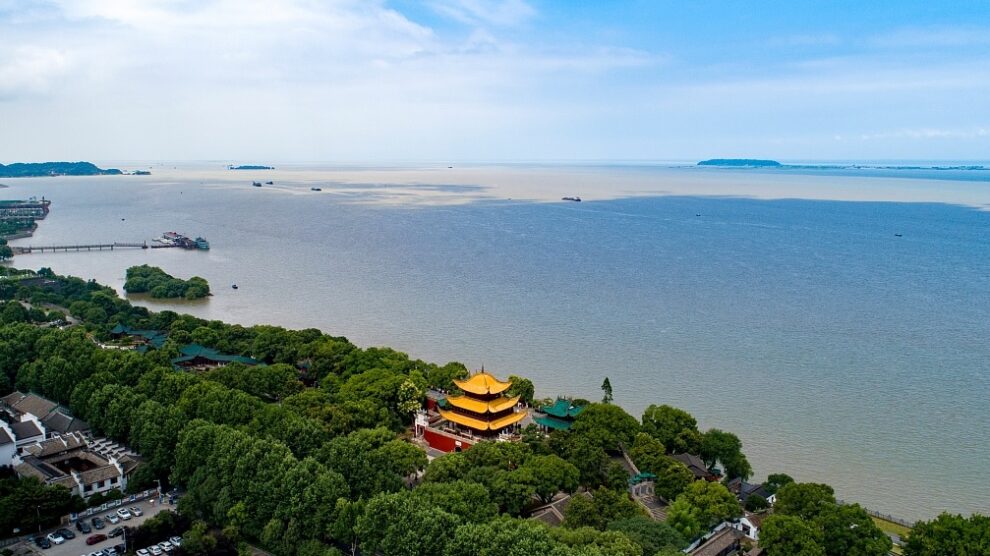Dorothy Chisi is a reporter of Times of Zambia. The article reflects the author’s opinions and not necessarily the views of CGTN.
Climate change is the defining issue of our time and we are at a defining moment.
From shifting weather patterns that threaten food production, to rising sea levels that increase the risk of catastrophic flooding, the impacts of climate change are global in scope and unprecedented in scale.
This global emergency has been blamed on human activities that are offsetting natural life cycles in sensitive areas such as wetlands, threatening large-scale disruption to food availability and agriculture in particular.
However, China is among the countries that could help to provide lessons in reversing the damage caused by human activity and restore the natural environment.
In the Dongting Lake National Nature Reserve located in Yueyang in Hunan Province, the government has taken steps to stop ecological depletion by banning human activities such as fishing.
Two years ago, President Xi Jinping announced a 10-year ban on all human activity to allow the restoration of nature and wetland protection.
A visit to the Dongting Lake two years after the ban was introduced shows that the natural environment is slowly being restored, with numbers of some fish and bird species recovering compared to the period prior to the ban.
Song Yucheng is among the people responsible for the Dongting Lake.
He said the ban has yielded benefits that even the local people appreciate.
Song said the government initiative to protect the lake has stopped illegal fishing, which had previously caused a lot of damage, leading to depletion and near extinction of many fish species.
“The law to protect the lake has created more room for more fish, resulting in good ecological growth. The whole ecological environment is closely related to people’s lives. So it’s time to create a period for the breeding of fish as well as the migration of birds which used to happen in the past,” he said.
Song said the Dongting Lake is also home to 359 bird species of which 18 are afforded the highest level of state protection. These include the oriental white stork, the black stork and the white crane.
A total of 64 species are protected at the second level of state protection.
The project to restore the Dongting Lake National Nature Reserve is an initiative that countries like Zambia can draw lessons from.
Zambia is endowed with a number of wetlands that face growing threats from human activities, such as land conversion for large-scale agriculture, urbanization, water infrastructure development, over-abstraction, the introduction of invasive species, unsustainable fishing practices and mining.
Despite their ecological, social and economic significance, the wetlands in Zambia are endangered by uncontrolled, unsustainable and destructive utilization, which in the long term threatens their integrity.
For instance, the Lukanga Swamps in Zambia’s Central Province, which are home to several endangered species, suffer the consequences of climate change – including high temperatures and extreme weather events such as floods and droughts.
Overfishing and the use of unsustainable fishing methods are rapidly depleting the region’s natural resources and causing soil degradation.
To control overfishing and help restore local fish species in the swamps as well as across the entire country, the Zambian government implements a three-month annual fishing ban targeting the breeding season to sustain local fish species in streams, rivers and lakes.
But the fish are getting smaller in size and catches are no longer as plentiful as they used to be.
Besides that, illegal fishing methods have continued to pose a serious threat to fish of all sizes, including their eggs, which could result in many local species disappearing from water bodies.
With the benefits seen in the Dongting Lake National Nature Reserve, there is a need for countries like Zambia to work with China in protecting areas of ecological importance.
A study of protected areas published this month by nature.com indicates that there is mounting evidence suggesting that the community-based conservation approach employed in the Dongting Lake National Nature Reserve in China is creating considerable benefits.
The study says the benefits achieved in the reserve demonstrate that the “fence and fine approach” is still an effective management tool which can shape positive attitudes towards conservation and pro-environmental behavior, especially in protected areas with large communities.
It calls for appropriate community-based conservation approaches, which can mitigate conflicts.
According to the World Wide Fund for Nature (WWF), millions of Zambians directly depend on wetlands for agriculture, fisheries, livestock rearing and much more through industries like tourism, commercial agriculture and water transportation.
WWF Zambia says poverty eradication and sustainable development in Zambia cannot be realized without the wetlands.
The Kafue Flats are a good example.
The region provides approximately 50 percent of the country’s hydroelectricity and 44 percent of the water supply to three million people in Zambia’s capital, Lusaka, and the surrounding industries.
The Kafue Flats also provide nearly 90 percent of sugar for domestic and export markets, and support an estimated 20 percent of Zambia’s national cattle herd.
The region also produces maize, predominantly through smallholders, and sustains one of Zambia’s most productive wild fisheries.
Close coordination of countries such as Zambia and China has the potential to provide solutions in protecting ecozones such as wetlands, besides boosting economic benefits of local communities and safeguarding national food security especially now when many countries are experiencing rising food prices due to severe shortages.
Most importantly, coordination of countries in programs aimed at controlling human activities will also help to address, if not reverse, the worrying consequences of climate change, which, if left unchecked, will cause famines and wipe out livelihoods.
Source : CGTN











